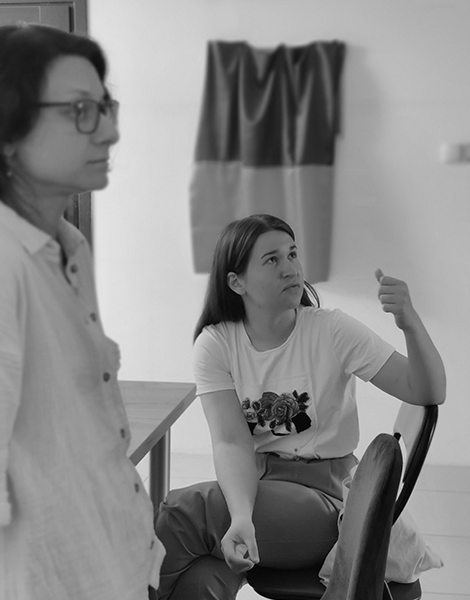Цей матеріал також доступний українською
“The residency programme helped me come back to the world. I wrote my first articles since the war there,” says journalist Iryna Chyshko.
“When you are working 24/7 for victory, you don’t have time to think about your own needs; there is no way out of burnout and physical exhaustion. It is extremely important to have time to ‘recharge’… I regained resources for new projects to serve our community, which I have already started to implement upon my return home,” says another Ukrainian activist.
These sentiments are echoed by other participants of the ‘Work and Rest’ residency programme run at the EED Centre for Ukrainian Activists (CUA) in Przemyśl on the Polish-Ukrainian border. Participants experience the residency as an opportunity to meet colleagues at a time when many are separated from families and friends, and to remove themselves, temporarily at least, from the daily stresses of war-scarred lives.
Flexible programme adapted to needs of participants
Each ‘Work and Rest’ programme runs for one or more weeks and includes training, mentorship and psychological support sessions. Skilled trainers keep a constant eye on the wellbeing of the participants and help them process the psychological stresses they have experienced during the long months of war.
Participation in all parts of the programme is voluntary, and the sessions are held at times that suit the attendees, all of whom continue to work throughout the residency. For many, these are weeks of a creative reawakening, and they also have access to a well-equipped CUA centre for their work.
Trips are also organised during the residency, including to places of cultural interest and in the case of journalists, to Polish media outlets such as Gazeta Wyborcza in Warsaw.
A lifeline for activists and journalists at this time of work
The residency offers an important lifeline for journalists and activists who had little or no previous experience of war prior to 24 February, many of whom have been forcibly uprooted from their homes and their personal and professional communities and are now experiencing precarious living conditions.
Kseniya Minchuk, a podcast producer with EED partner Hromadske Radio, fled Kryvyi Rih in central Ukraine on 1 March and is now living with her son in Poland. “I had nowhere to live when I started the residency,” she says. “I brought my son along. The residency was a chance for me to get away and to relax, as well as to learn. I learned techniques from the psychologists to manage stress.”
Many have experienced abnormal levels of stress in recent months. One recent group of participants included journalists who have been documenting Russian war crimes. Others have been providing humanitarian aid to frontline areas of the war since late February.
For Hanna Starkova, a journalist from Censor.net in Kharkiv, this psychological support aspect of the programme was vital. “I knew I needed counselling, and this was a good way to start. It’s difficult to process all that has happened. The residency gave me the chance to switch off and look after my mental health. As it was held in Poland, I was able to remove myself physically and mentally from the constant strain of being in Ukraine. I felt I could talk to people more freely,” she says.
Helping journalists continue to work
The highpoint of the residency for most of the attendees was meeting with other journalists, both Ukrainian and Polish, and comparing experiences and learning from them. “I met journalists from various Ukrainian media. Talking with them, I understood that we are all addressing this war, maybe from different points of view, but we all have the same task. This programme helped to confirm my belief that we can do this job together. We are stronger together,” says Hanna.
Above all, participants feel that this residency helps them continue to face the work they all believe is necessary for Ukraine’s future.
“We are incredibly grateful for making this trip possible… You have helped so many people before us and will help so many after us to regain full energy and strength. Friends, you are doing incredible work for Ukrainian journalists, volunteers and activists,” says a recent activist participant.
This article reflects the views of the grantee featured and does not necessarily represent the official opinion of the European Endowment for Democracy, the European Commission or any other European State or other contributors to EED.
